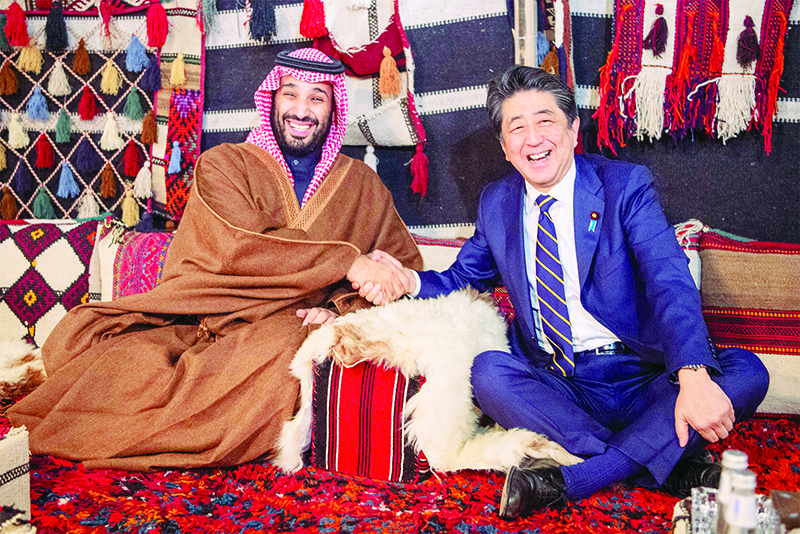
RIYADH/PARIS: Japanese Prime Minister Shinzo Abe has warned that military confrontation with Iran will impact global peace and stability, as he visits the Middle East hoping to ease tensions spiked by the US killing of a top Iranian general. His comments came at the start of a five-day Gulf tour that had been thrown into doubt after Tehran responded to the attack on Qasem Soleimani by launching a barrage of missiles at bases hosting American troops in Iraq, prompting fears of all-out war.
But as those concerns receded, the Japanese premier decided to go ahead with the visit and on Sunday discussed regional tensions during an hour-long meeting with Saudi Crown Prince Mohammed bin Salman in northwestern Al-Ula province, according to foreign ministry spokesman Masato Ohtaka. "Any military confrontation in the region that includes a country like Iran will have an impact not only on peace and stability in the region but the peace and stability of the whole world," Abe said, according to Ohtaka.
Abe called "on all relevant countries to engage in diplomatic efforts to defuse tensions", Ohtaka added. The spokesman said the two leaders agreed on working closely on maritime security in the region and discussed Tokyo's decision to send a destroyer for intelligence activities along with two P-3C patrol aircraft to the Middle East. Japan, however, will not join a US-led coalition in the region.
Tokyo has walked a fine line in balancing its key alliance with Washington and its longstanding relations and interests with Tehran. Ohtaka said that Abe stressed the importance of a continuous and stable Saudi oil supply to Japan. The prime minister's tour will also include visits to the United Arab Emirates and Oman.
Meanwhile, King Abdullah of Jordan yesterday warned that the Islamic State group was regrouping and was once again on the rise in the Middle East. Months after the ousting of IS last year from their last Syrian holdout, Abdullah said his "major concern is that we have seen over the past year the re-establishment and rise of ISIS", not only in southeastern Syria, but also in western Iraq.
"We have to deal with the reemergence of ISIS," the king added in an interview with TV channel France 24 ahead of talks this week in Brussels, Strasbourg and Paris. He also said many foreign fighters from Syria were now in Libya. "From a European perspective, with Libya being much closer to Europe, this is going to be an important discussion in the next couple of days," Abdullah said. "Several thousand fighters have left Idlib (Syria) through the northern border and have ended up in Libya, that is something that we in the region but also our European friends will have to address in 2020."
Regarding last week's spiking of tensions between Iran and the United States, Abdullah said he hoped that "in the next several months we set the right tone for the region, which is really to bring the temperature down". "So far it looks like de-escalation, we hope that that continues to be the trend. We can't afford instability in our part of the world. "Whatever happens in Tehran will affect Baghdad, Amman, Beirut, the Israeli Palestinian process."
Abdullah added that the recent deployment of Turkish troops in a training capacity to Libya "will only create more confusion" in the country. Both sides in Libya's conflict agreed to a ceasefire from Sunday to end nine months of fighting, following weeks of international diplomacy and calls for a truce by power-brokers Russia and Turkey.
A UN report in November said several countries were violating the arms embargo on Libya in place since the overthrow of Muammar Gaddafi in 2011. Jordan and the United Arab Emirates have regularly supplied the forces of Libyan military strongman General Khalifa Haftar, who is backed by Turkey's regional rivals - Saudi Arabia, Egypt and the UAE. Jordan, whose stability is seen as vital for the volatile Middle East, hosts some 1.3 million refugees from neighboring war-torn Syria. - Agencies
.jpg)
